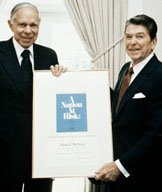PESPD's Myth #10: Because of our poor public education system, we are falling behind other nations
I just got The Knowledge Deficit and the author, E. D. Hirsch recites a familiar refrain. The subtitle on the front cover reads, "Closing the Shocking Education Gap for American Children," and Hirsch begins his book by saying, "The public sees that something is badly amiss in the education of our young people." I swear that if I had a dollar for every time I’ve heard this type of thing from educational experts, I’d be a millionaire. I wonder how many people realize for how long we’ve been told “that something is badly amiss” in American education.
 I remember reading Michael Crichton’s Rising Sun in the early 1990s. When the book came out, the U.S. was mired in a recession and Japan’s economy was rolling along. They seemed to be able to do no wrong. Rising Sun led the reader to believe that Japan was on the verge of taking over the United States economically, and of course, one of the main culprits was our education system.
I remember reading Michael Crichton’s Rising Sun in the early 1990s. When the book came out, the U.S. was mired in a recession and Japan’s economy was rolling along. They seemed to be able to do no wrong. Rising Sun led the reader to believe that Japan was on the verge of taking over the United States economically, and of course, one of the main culprits was our education system.Perhaps the most famous lambasting of American public education came in 1983 when the National Commission on Excellence in Education published Nation at Risk. We were told that " if an unfriendly foreign power had imposed our schools upon us we would have regarded it as an act of war." Many people remember that, but if you think that was the beginning of reports decrying the horrible state of American education, you’d be wrong. Peter Campbell did an excellent post a couple weeks ago featuring a Life Magazine cover that breathlessly announced a series of articles on the crisis in American education. The date on that magazine: March 24, 1958.
 So for at least the last fifty years we have been hearing pronouncements that our education system—especially public education—has been doing a horrible job, and these pronouncements have inevitably been accompanied by doom and gloom prophecies about what this would mean for our nation’s future. If we were to take seriously what the elites have been telling us about the American education system for the last fifty years, we should have been shocked when America landed the first man on the moon, then shocked again when it became clear that we had won the Cold War. Then we should have been absolutely flabbergasted when our economy recovered and became the envy of the world for the last two-thirds of the 90s, while Japan’s went into the tank. My question is this: If our public education system has been so terrible—or failing, as so many like to say—how in the world has our nation continued to do so well?
So for at least the last fifty years we have been hearing pronouncements that our education system—especially public education—has been doing a horrible job, and these pronouncements have inevitably been accompanied by doom and gloom prophecies about what this would mean for our nation’s future. If we were to take seriously what the elites have been telling us about the American education system for the last fifty years, we should have been shocked when America landed the first man on the moon, then shocked again when it became clear that we had won the Cold War. Then we should have been absolutely flabbergasted when our economy recovered and became the envy of the world for the last two-thirds of the 90s, while Japan’s went into the tank. My question is this: If our public education system has been so terrible—or failing, as so many like to say—how in the world has our nation continued to do so well?Michael Barone in his book, Hard America Soft America, belittles public education for producing some of the “softest” 18-year-olds in the world, but then he goes on to say that our 30-year-olds are some of the “hardest.” One reading Barone’s book could reasonably conclude that this country has the most ingenious business leaders and the most productive workers in the world. Barone also reports that the number of workers in America who say they are unhappy with their jobs is at a record low; so in addition to being productive, our people are happy. He also boasts of our military as being unrivaled in the world. Whether he knows it or not, Barone has done a better job than I ever could of making the case that the American education system has been doing a great job.
Although many of the 18-year-olds that I know are a lot tougher than Barone gives them credit for, who cares if they’re hard at that age, as long as they end up turning out the way he says they do? Should our public education system be trying to produce “hard” 18-year-olds, or should we be trying to produce people who are capable of becoming happy and productive adults? He might want to throw the credit elsewhere, but one way or another, according to Barone, we are doing an outstanding job of the latter.
Whether Barone knows it or not, it is not the job of public education to produce entrepreneurs. But it is our job to produce enough people who will be able to become entrepreneurs, and we are obviously doing just that. It is not our job to produce soldiers, but it is our job to produce people who can become soldiers, if that’s what they want to do. I don’t know how many times during the last few years that I’ve heard that America has the best educated and best trained military in the world, so apparently we’re not doing too badly there either. It is not even the job of public education to produce doctors, lawyers, teachers, and mechanics, but it is our job to produce enough people who can become those things if they want to. Once again, we are obviously doing that.
I’m a public school teacher, and I’m proud of that. I’m proud of that, in large part, because I teach in a school that does a good job educating kids. We aren’t perfect; we certainly have our share of problems, but we don’t come close to resembling the portrait of a public school that is painted by sour-pussed public school critics. A student who comes to our school who has a desire to go to college will probably be able to do so and be successful there, and the evidence bears that out.
 The young woman on the left is Chrissy Hallett, a graduate of Warroad High School. This picture was taken a year ago when she graduated from Harvard Law School. When Chrissy was a senior, she earned a perfect score on the SAT--both portions. Not bad for a kid going to a little rinky dink public school on the northern edge of Minnesota.
The young woman on the left is Chrissy Hallett, a graduate of Warroad High School. This picture was taken a year ago when she graduated from Harvard Law School. When Chrissy was a senior, she earned a perfect score on the SAT--both portions. Not bad for a kid going to a little rinky dink public school on the northern edge of Minnesota.And Chrissy is no fluke. We have kids attending the University of Minnesota, the University of North Dakota, and several state and private universities in our region. We’ve had kids go to Harvard, Yale, Princeton, Stanford, and other prestigious universities around the nation. We have former students who are doctors, lawyers, biological engineers, computer programmers, teachers, nurses, and just about anything else you can name. We have former students who work in large corporations and others who have started their own businesses.
As much as this might shock public education critics, the performance of the graduates of Warroad High School is not an aberration. Our students might score a little higher than average on tests on a national scale, but there is no evidence that we are in a league of our own. A teacher from the Roseau School District, which is twenty miles to our west, could list accomplishments of their former students just as easily as I can, and so could a teacher from Lake of the Woods High School, which is thirty-five miles to our east. There is no question that there are thousands of public schools around the nation that do just as good a job as we do, but you would never know that by listening to the critics of public education.
Everyone knows there are school districts in various areas of our nation that have major problems, and we need to do whatever it takes to make it possible for kids to get a decent education in those places. Maybe those schools require drastic change. But what is frustrating to me is that public education bashers have managed to convince too many people that our worst performing schools are "typical." Although even good school districts like mine need to constantly be looking for ways to solve the very real problems that we have and to improve, the idea that we need to have a massive overhaul of all public schools because they are generally horrible and in crisis is just plain wrong. The so-called “crisis” in American education in 2006 is no more real than was the “crisis” in American education in 1958. Those of us in good public schools need to do a much better job of getting out the truth: there are a lot of public schools that do a much better job than most people realize.



10 Comments:
You fail to consider, though, the inconvenience caused by public education. Think, for example, of how it adversely affects Steve Forbes' tax bill.
Furthermore, most teachers are unionized. This precludes paying them minimum wage, and often results in benefits like health insurance and pensions.
It would certainly be easier to deny such benefits to more people if we stopped giving them to teachers. This would result in more profits for corporations, as well as more profits for Steve Forbes.
Kindly get with the program.
Gee, NYC, I never thought of that. Silly me! Maybe I should take it all back.
Nah!
We live in a great country, but THEY like to keep us in perpetual fear and pessimism.
I know. Some people just don't care about Steve Forbes at all.
Personally, I find it horrifying.
Hi Dennis:
I'm a science teacher on the Iron Range. I have really enjoyed following your blog thsese last several weeks.
What's next now that you've covered your "10 Myths"? Hope you have something good planned for us for the rest of the summer!
Thanks for giving me something new to read and consider every morning.
Amy Hendrickson
Happychyck, you speak the truth! It think it's even more true for some things than others, though, and it seems like it has been the most true for anything involving public education.
Amy, thanks for the very nice comment. As you probably know, I taught on the Iron Range for 15 years. Declining enrollment finally got the best of me, but I really liked the people there.
I probably am going to be a little lost without my "myths" to write about, and I'm glad you enjoyed them. I guess I'll just have to wing it for awhile. Thanks again!
We see the same thing about people's feeling about Congress-- people blame Congress for being obstructionist, but they generally approve of their own congressman's performance. People like to vilify public schools, but most think their own district does a pretty good job.
I like NYC's perspective. If it weren't true, it'd be paranoid. Unfortunately, we're not paranoid.
I think the place where you and I disagree, based on this post anyway, is that I don't believe the sole purpose or even the primary purpose of public primary and secondary education is to prepare people for future careers. I believe the primary purpose of public primary and secondary education is to prepare people to be good citizens. In that we have failed. We have a citizenry that does not participate in a meaningful way in the political process, that cannot read a newspaper critically, and that has little to no understanding of the cultures or languages of other countries that make up 95 percent of the world's population.
Public education has its own shortcomings though it is available for the majority of people and I reckon it is the best advantage. If you're reluctant to know more, turn to this site http://bigessaywriter.com/blog/crisis-in-educational-system-myth-or-reality
Teachers' unions play a crucial role in advocating for the rights and benefits of educators, ensuring fair working conditions, and supporting quality education. They negotiate better wages, job security, and professional development. On a different note, "irda meaning" refers to the Insurance Regulatory and Development Authority in India.
Post a Comment
<< Home